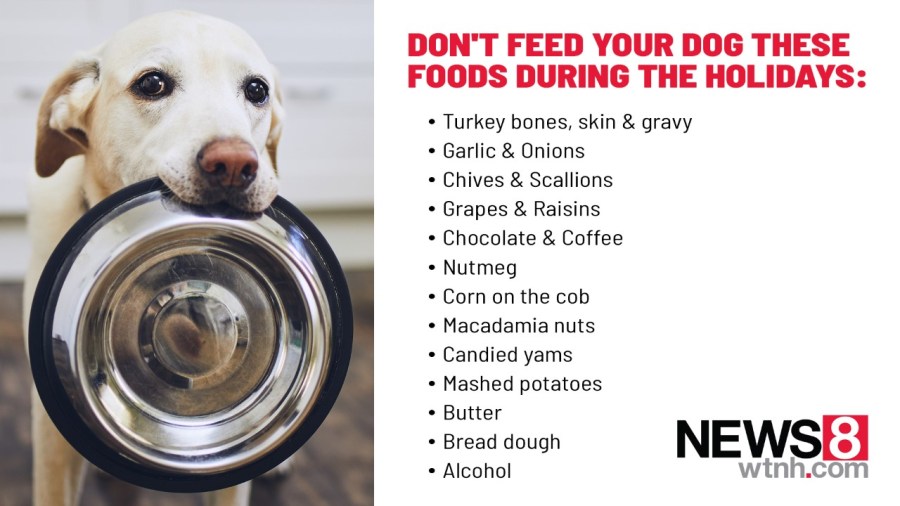(WTNH)– With the holidays approaching, you can count on your pups waiting for a snack from that Thanksgiving spread.
But, before you give into that mooching pooch, be aware of the foods that can lead to illness or even death.

Turkey bones, skin and gravy
White meat turkey is fine to share with your four-legged friend, but
Bones can be a choking hazard and could injure their intestines.
Garlic, onions, scallions, chives
All of these are in the Allium family, causing toxic anemia in dogs and cats.
Grapes and raisins
You should never give these to your pup! Even a small amount of grapes can cause fatal kidney failure in dogs.
Chocolate and coffee
Just small amount of either cause vomiting and diarrhea for your dog, but later amounts can be fatal.
Candied yams, mashed potatoes
While veggies like yams and potatoes aren’t bad for dogs, the added fat and sugar can make your dog ill.
Stuffing
Many of the seasonings that go into stuffing are harmful to dogs — not to mention the extra fats will upset your dog’s stomach.
Corn on the cob
The corn itself isn’t the problem — it’s the cob that can be a choking hazard.
Nutmeg
The popular pumpkin pie spice is toxic in large doses but could make your pet sick in smaller amounts.
Alcohol
Dogs can feel the effects of alcohol just like humans do, but our furry friends are much smaller than us so the risk for alcohol poisoning is greater.
UPDATE:
Dr. Thomas Maley and Dr. Sasha Golovyan of the Animal Clinic of Milford have released this list of tips to avoid pet illness, injury or worse during holiday meals:
- Hors d’oeuvres: Your guests may want to share their appetizers with your pets. To avoid your pet from begging and stomach upset is to let everyone to know “please do not feed the animals!”
- Turkey: Eating turkey or turkey skin – sometimes even a small amount – can cause a life-threatening condition in pets known as pancreatitis. Fatty foods are hard for animals to digest. If you want to share a Thanksgiving treat with your pet, make or buy a treat that is made just for them
- Kitchen Trash Can: A turkey carcass sitting out on the carving table, or left in a trash container that is open or easily opened, could be deadly to your family pet. Dispose of turkey carcasses and bones – and anything used to wrap or tie the meat, such as strings, bags and packaging – in a covered, tightly secured trash bag placed in a closed trash container outdoors (or behind a closed, locked door).
- Stuffing: If you use raisins, onions, chives, garlic, or scallions to prepare your stuffing (and who doesn’t) make sure your dog steers clear. Stuffing often contains those key ingredients that are toxic to pets.
- Dessert: No pie or other desserts for your pooch. Chocolate can be harmful for pets, even though many dogs find it tempting and will sniff it out and eat it. The artificial sweetener called xylitol – commonly used in gum and sugar-free baked goods – also can be deadly if consumed by dogs or cats.
- Guests: Some pets are shy or excitable around new people or in crowds, and Thanksgiving often means many visitors at once and higher-than-usual noise and activity levels. If you know your dog or cat is nervous when people visit your home, put him/her in another room or a crate with a favorite toy. If your pet is particularly upset by houseguests, talk to your veterinarian about possible solutions to this common problem.
- Quick action can save lives. If you believe your pet has been poisoned or eaten something it shouldn’t have, call your veterinarian or local veterinary emergency clinic immediately. You may also want to call the ASPCA Poison Control Hotline: 888-426-4435. Signs of pet distress include: sudden changes in behavior, depression, pain, vomiting, or diarrhea.
















